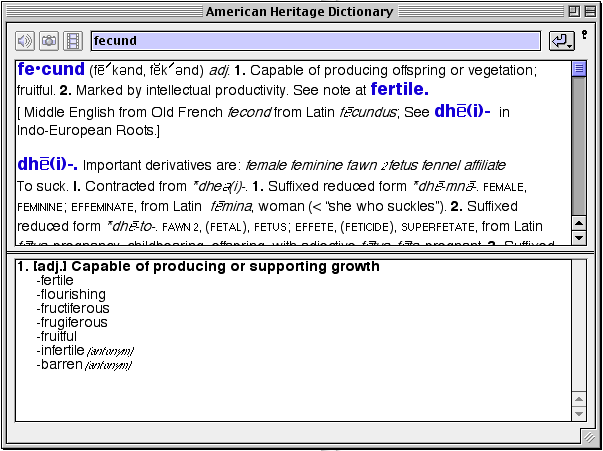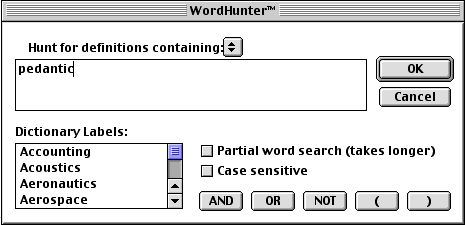American Heritage Dictionary vs Merriam Webster Collegiate (2004)
I learned English literally by looking up dictionaries.
Of the English dicts i've used, mostly it's just American Heritage Dictionary (AHD) and Merriam Webster Collegiate (MWC). In the early 1990s i used MWC. Since 1995 i got AHD on computer and almost never bothered to turn a paper page again. Since 2003 i've got MWC on computer too. Also in 2003 i bought Microsoft Encarta encyclopedia on PC that includes Microsoft's own dictionary (a collegiate-sized dict). On occasion i check other dicts in libraries, such as OED or Random House International, but due to practicality, i've used AHD and MWC daily and exclusively and extensively for the past about a decade. On periods i'm writing or actively reading, i lookup a hundred or two times each day.

Of the 3 (AHD, MWC, Encarta), AHD is the best by far. If you don't understand a word, AHD provides understanding much better than MWC. If you want etymology, AHD gives in paragraphs, as opposed to MWC's single sentence. AHD also provides valuable notes for many words. They include usage, interesting background, synonym nuances, at a level professional word buff will appreciate. Merriam-Webster Collegiate dictionary is just about the worst in all aspects. Terse and pedantic, often incomprehensibly.
I was a MWC fan because it was my first pure English dictionary and i used it extensively for several years in the early 1990s. MW bills itself as being authoritive. However, after using AHD now in comparison, i find MWC not in anyway authoritive. It's a bit more pedantically prescriptive, and in practice sketchy. As far as definition accuracy goes, some 70% of the time I prefer ones given by AHD.
In comparison, using MWC feels like trying to understand thru synonyms. If you are dithering over words for exact nuances or background research as often called in writing (or — heaven forbid me in admission — in writing poetry), the terse and pedantic definitions given by MWC help little.
MS Encarta dict is a learner's dict. It takes ostensibly a explanatory approach. It's decidedly much inferior than AHD too. (I haven't used it extensively as the other two, but have noticed that due to the extreme “explanation” approach, it often gives wrong or misleading definitions, and totally disregard how words were originally used.) Between MWC and Encarta, i'm not sure which i prefer. Possibly MWC because at least it is honored and endured.
Software Aspects
Since i use these dicts on my computer, i might as well comment on their software aspect. Again, AHD here is splendid in every aspect. (i'm a software programing professional) And here MWC is worst of the worse. For example, AHD allows you to type wild-cards such as “*ism” for all words ending in “ism”, or “f??k” for all such four letter words including fuck. AHD allows searching of definition content as you'd do so with searching computer file contents (they call this feature Word Hunter™). AHD lists definitions and synonyms at the same time. (you can set it to display just one or the other by default if you so wish) MWC software provides only a few of these extremely useful amenities, but made them extremely cumbersome to use.

AHD also provides on-target guesses when a word's spelling is just on the tip of your tongue. (such as a glaringly foreign imported word you just picked up). When a dictionary decided to punish you for not being a spelling bee and refuses to let you find it, it is very frustrating. This is true of MWC and Encarta. AHD software also provide well-designed keyboard shortcuts. So you can move about different panes or functions easily, and do copy and paste if so needed. MWC forces you to use the mouse and menus painfully on every use. MWC complicate things with modes. For example, if i type “love” in the current Definition Mode, i then have to pull-down Thesaurus Mode and type it again to query if i want love's synonyms. Then, to look up another word i have to switch back to Definition Mode again. Under each of the Dictionary mode and Thesaurus mode, there are 3 sub-modes: “basic searches”, “advanced searches”, “browse”, then there's a “spelling help” button extra. In AHD, all of these are integrated in one-shot lookup and display-all without forcing user to run thru menus and tabs gauntlet for partial info.
The Encarta dict provides none of these extra features. Just plain definition and thesaurus. (also as two separate modes) No wild-card or search definition or anagram amenities. However, it does have a translation feature between English and Spanish, French, Italian, German, in bi-way lookup. I haven't used it. As for software interface, it's minimally usable. For example, it doesn't allow you to resize window, so you are stuck with scrolling around its small window. It doesn't have a direct keyboard shortcut to put the cursor on the input box. Instead, you have to press tab or shift-tab 6 times, or use the mouse to put the cursor in the input box. Still it is far better than MWC's interface cumbersomeness extraordinaire.
All 3 have the ability to speak the word. Encarta here is notably unclear and synthesized.
The versions i'm reviewing are:
- The American Heritage Dictionary Version 4.0 (1995) for Mac OS. (American Heritage Dictionary of the English Language, 3rd ed. 1992 by Houghton Mifflin Company)
- Merriam-Webster version 2.5. (2000) (for both PC and Mac (runs in Classic under OS X).)
- Encarta Dictionary Tools as part of Microsoft Encarta Reference Library 2003. (the BEST electronic encyclopedia on computer, all things considered, period.)
Note: online versions may be slightly different than what i have on my computer. For example, i noticed that the online AHD at various sites sometimes are missing “usage notes” (which are typically 2 or 3 paragraphs long). Also, as far as i tried, i know of no online version that lets you search by wildcard.
Addendum: I did not realize until today that American Heritage Dictionary is actually not a collegiate/abridged dictionary, and Merriam-Webster Collegiate is not its full version Merriam-Webster dictionary. No wonder AHD beats M-W Collegiate by far. The famed Merriam-Webster is about its full version, not the Collegiate edition.
On Dictionaries
- American Heritage Dictionary vs Merriam Webster Collegiate (2004)
- American Heritage Dictionary vs New Oxford American Dictionary (2006)
- 1913 Websters Dictionary and WordNet (2007)
- Problems of Open Source dict.org Dictionary (2008)
- Google Dictionary Shutdown (2011)
- List of Online Dictionaries. 2011
- English Phonetics: IPA vs American Heritage Dictionary vs Merriam-Webster (2005)
- Thumb-indexed dictionary